Introduction
Dental problems cause aReversed phone numbers for Far West and Western NSW great deal of pain to young children and treatment can be very stressful. So, it is very important to avoid or limit dental treatment for children with special needs by keeping teeth healthy. Fortunately, most dental diseases are preventable and this booklet gives parents and carers some simple, practical advice on how to keep children’s mouths looking and feeling great. This includes specific advice about diet and tooth brushing.
Diet and good dental health
Weaning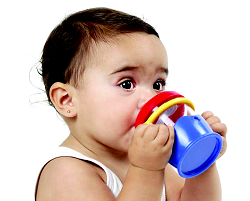
In order to give the baby teeth a chance to come through into the mouth in a healthy condition it is important to:
- Stop the bottle by 12 months of age.
- Introduce a sippy cup from 6 months of age.
- Do not use a bottle containing milk or juice as a night time comforter.
A dental professional can provide you with specific advice regarding your child’s individual dental health needs.
When your child is eating solid food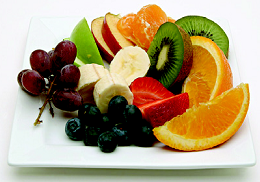
- Do not allow your child sugary snacks between meals.
- Foods containing sugar like flavoured yoghurts, muesli bars, dried fruit and fruit drinks should only be offered at meal times.
- Never allow your child sugary foods or drinks last thing at night.
- Provide healthy snacks between meals including fresh fruit, vegetable sticks, cheese and plain yoghurt.
- Provide meals and planned snacks at set times during the day to prevent ‘grazing’ as this leads to tooth decay.
- Drink tap water between meals.
- Avoid soft drinks, cordial or juice as they are high in sugar and are very acidic.
- Give dietary supplements at mealtimes where possible.
Tooth brushing tips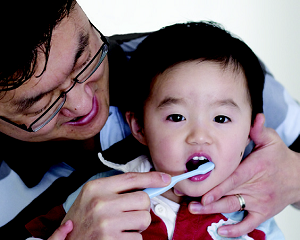
- Make sure you clean your child’s teeth twice a day with a fluoride toothpaste as soon as they come through into the mouth.
- Use a toothbrush with a small soft head.
- Young children need help with tooth brushing.
- Some parents put the child’s head in their lap and others find standing behind their child is helpful when brushing the teeth.
- Some children find it easier to have their teeth cleaned with an electric toothbrush.
- Your child’s dental team can give you personal advice about tooth brushing and the appropriate toothpaste to use.
- A superbrush or a three sided toothbrush may help clean several tooth surfaces at once.
- Use two toothbrushes one to brush while the other distracts.
- If your child clamps on the toothbrush leave it as a prop, and use a second brush to clean the teeth you can reach.
- Two toothbrushes taped back to back may help keep the mouth open.
If your child doesn't want the teeth brushed...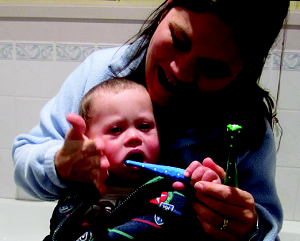
- Brushing different parts of their mouth at different times may help.
- Holding onto a vibrating object such as an electric toothbrush or toy may take the focus away from the mouth.
- Massage around the mouth and cheeks to improve muscle tone, saliva flow and desensitise the area.
- Try play activities that can help mouth functions such as mouth toys, blowing instruments, or using a straw.
- Massaging the lips before or while brushing, can help you get the brush in mouth.
A strong tongue or tight lips
- The lips and cheek should be gently pulled back to allow you to see the teeth.
- A flannel or handkerchief can be wrapped around the forefinger to gently retract the lips.
Children who have difficulty swallowing
- Tooth brushing for children who are non-orally fed or have difficulty swallowing (dysphagia) is very important because leaving plaque and bacteria on the teeth can lead to chest infections.
- Brushing the teeth will make the mouth feel more comfortable and reduce any bad breath.
- To help make brushing easier for your child, tilt their head forward while brushing.
- Use a low foaming toothpaste, such as Colgate My First Toothpaste or Macleans MilkTeeth.
Medical conditions and medications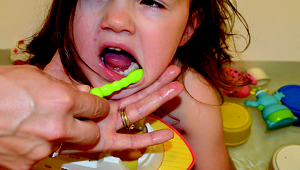
- Some medical conditions may increase your child’s risk of dental disease.
- Certain medications may cause side effects such as dry mouth which can also increase your child’s risk of dental disease.
- Your dental care professional can provide you with specific advice.
Helpful hints that other parents have found useful
- Brushing teeth in the bath can be fun.
- Start brushing from the front, gently moving the brush to the back teeth.
- Distractions such as music or TV may be helpful.
Your child’s individual home care plan
Tooth brushing and toothpaste:
Diet:
Other information:
Please call if you have any problems or questions.
Tooth smart chart
Brush smart
Help my child to brush their teeth in the morning. |
|
|
|
|
|
|
|
|---|
Brush smart
Help my child brush their teeth at night. |
|
|
|
|
|
|
|
|---|
Snack smart
Give healthy snacks during the day. |
|
|
|
|
|
|
|
|---|
Drink Smart
Give tap water between meals. |
|
|
|
|
|
|
|
|---|
Stay Smart: Remember, all family members should practice good oral health.
Contact telephone numbers for public dental clinics in NSW
| Central Coast |
1300 789 404 |
|---|
| Illawarra Shoalhaven |
1300 369 651 |
|---|
| Hunter New England |
1300 651 625 |
|---|
| Far West |
(02) 6809 8621 or 1300 552 626 |
|---|
| Mid North Coast |
1300 651 625 |
|---|
| Murrumbidgee |
1800 450 046 |
|---|
| Nepean Blue Mountains |
(02) 4734 2387 or 1300 769 221 |
|---|
| Northern NSW |
1300 651 625 |
|---|
| Northern Sydney |
1300 732 503 |
|---|
| South Eastern Sydney |
1300 134 226 |
|---|
| Southern NSW |
1800 450 046 |
|---|
| South Western Sydney |
(02) 9293 3333 |
|---|
| Sydney |
(02) 9293 3333 |
|---|
| Western Sydney |
(02) 8890 6766 |
|---|
| Western NSW |
(02) 6809 8621 or 1300 552 626 |
|---|
Disclaimer
Products mentioned in this booklet are suggestions only and are not endorsed by NSW Health. This resource has been developed by Northern Sydney Local Health District, Oral Health Services, Graphic Design by Mara Cvejic, Westmead Centre for Oral Health. Consents and licences have been obtained for all photographs and artwork used in this booklet.
SHPN: (COHS) 170324
